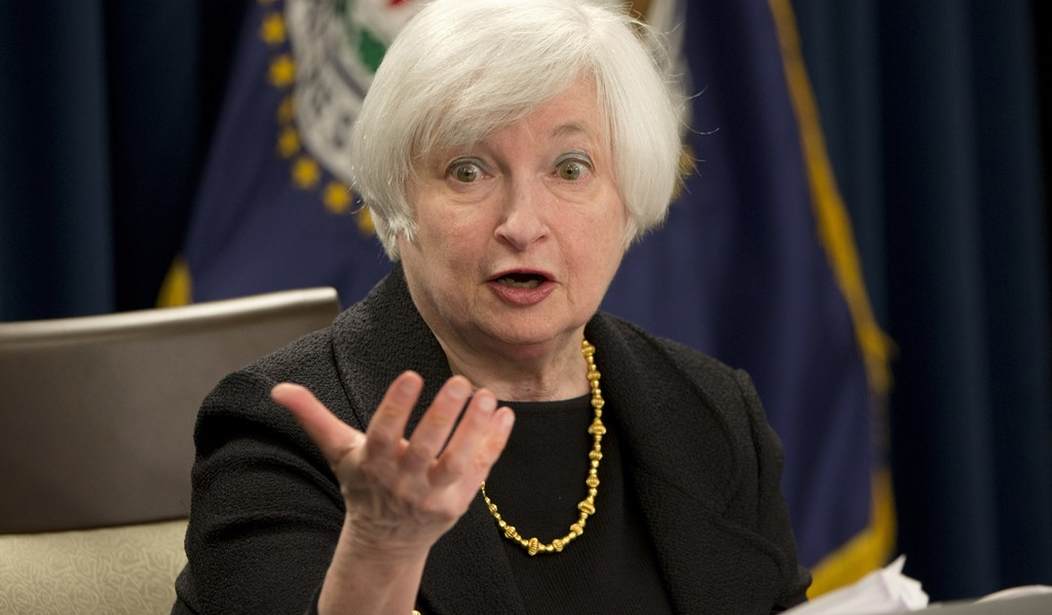The U.S. Treasury announced on Friday that it would soon begin to launch "extraordinary measures" as the United States will hit its debt limit next Thursday, January 19th, leaving the new Congress just six days in which to take any action to avert the need for such measures, which Treasury expects can stave off a default until early June.
In a letter to House Speaker Kevin McCarthy (R-CA), Treasury Secretary Janet Yellen noted that the United States' Debt Ceiling was raised to "approximately $31.381 trillion" in December 2021, a threshold that will be met next Thursday. As such, Yellen wrote, "Treasury will need to start taking certain extraordinary measures to prevent the United States from defaulting on its obligations."
Those "obligations" have ballooned under President Biden and the previous Congress in which Democrats running the House and Senate forced an aggressive tax-and-spend agenda with little to no regard for the consequences of their big government policies.
Yellen explained the two "extraordinary measures" her team "anticipates implementing" this month:
(1) redeeming existing, and suspending new, investments of the Civil Service Retirement and Disability Fund (CSRDF) and the Postal Service Retiree Health Benefits Fund (Postal Fund), and (2) suspending reinvestment of the Government Securities Investment Fund (G Fund) of the Federal Employees Retirement System Thrift Savings Plan. Congress has expressly provided Treasury with authority to take these actions, and prior Treasury Secretaries have used these measures, which will reduce the amount of outstanding debt subject to the limit and temporarily provide additional capacity for Treasury to continue financing the operations of the federal government. After the debt limit impasse has ended, the CSRDF, Postal Fund, and G Fund will be made whole.
Recommended
Secretary Yellen, who gave slim notice ahead of launching the extraordinary measures, demanded that "Congress act in a timely manner to increase or suspend the debt limit" to avoid "default on any obligation of the United States." If Speaker McCarthy and Senate Majority Leader Chuck Schumer can't pass agreeing bills through their two chambers, Yellen warned that "[f]ailure to meet the government's obligations would cause irreparable harm to the U.S. economy, the livelihoods of all Americans, and global financial stability."
In 2011, Yellen reminded, threats that the debt ceiling would not be increased to avoid default caused the "only credit rating downgrade in the history of our nation."
Yellen also warned McCarthy that the extraordinary measures she will begin next week aren't guaranteed to prevent a default for an exact length of time and "is subject to considerable uncertainty due to a variety of factors, including the challenges of forecasting the payments and receipts of the U.S. government months into the future." That quiet admission that the federal government continues to spend taxpayer dollars like drunk sailors means that Yellen is "not able to provide an estimate of how long extraordinary measures will enable us to continue to pay the government's obligations," but "it is unlikely that cash and extraordinary measures will be exhausted before early June."
Biden's treasury secretary closed by urging McCarthy to get to work having Congress "act promptly to protect the full faith and credit of the United States."
House Republicans have talked about tying any future debt limit increases to spending cuts, but that idea faces tough odds in the U.S. Senate or for signing by President Biden should a bipartisan agreement between the two chambers be reached. Whatever proposals are formally made, it's a foregone conclusion that things will get messy among the members of the legislative branch.
In Friday's White House press briefing, Karine Jean-Pierre said President Biden would not entertain any "conditions" or "negotiations" from Republicans over raising the debt ceiling.
And, without a doubt, the rapidly approaching debt limit will be made out to be a problem that the House's new Republican majority must solve, but the truly responsible parties are Democrats who taxed and spent their way through the last two years while in the majority. Yet the media and Democrats will not admit or entertain such realities — nor will they consider that this "emergency" situation ought to cause a review of and changes to how the United States maintains its finances.
Perhaps Yellen should have urged the Democrats in control of both chambers in the previous Congress to take some action to slow new spending and growing debt before "extraordinary measures" were needed to save the full faith and credit of the United States.

























Join the conversation as a VIP Member